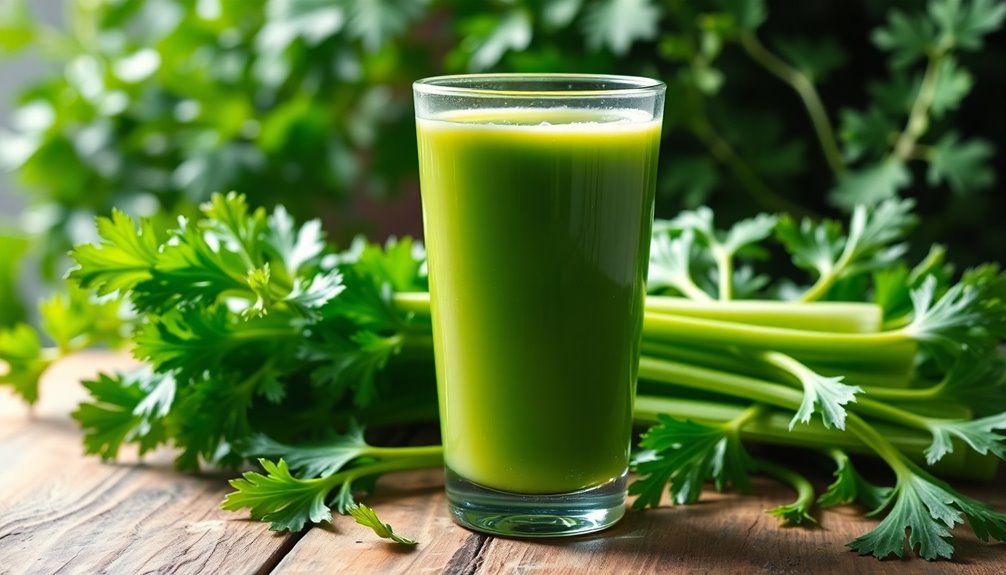Celery juice can be great for your kidneys! It helps reduce harmful crystal deposits, lowers protein levels, and boosts hemoglobin, which helps prevent anemia. Plus, its antioxidant properties fight oxidative stress, supporting overall kidney health. Just remember to enjoy it in moderation since it can have low fiber content and high oxalate levels. Want to learn more about its benefits and how to incorporate celery juice safely into your diet? There's plenty more to explore!
Key Takeaways
- Celery juice reduces crystal deposition in renal tubules, improving overall kidney function and health.
- It lowers proteinuria levels, enhancing kidney filtration efficiency in chronic kidney disease patients.
- Celery juice boosts hemoglobin levels, helping prevent anemia commonly associated with chronic kidney disease.
- Antioxidant properties in celery combat oxidative stress, supporting kidney tissue and reducing inflammation.
- Moderation is key; consult a healthcare provider before incorporating celery juice into your diet, especially with existing kidney conditions.
Health Benefits of Celery Juice for Kidney Function
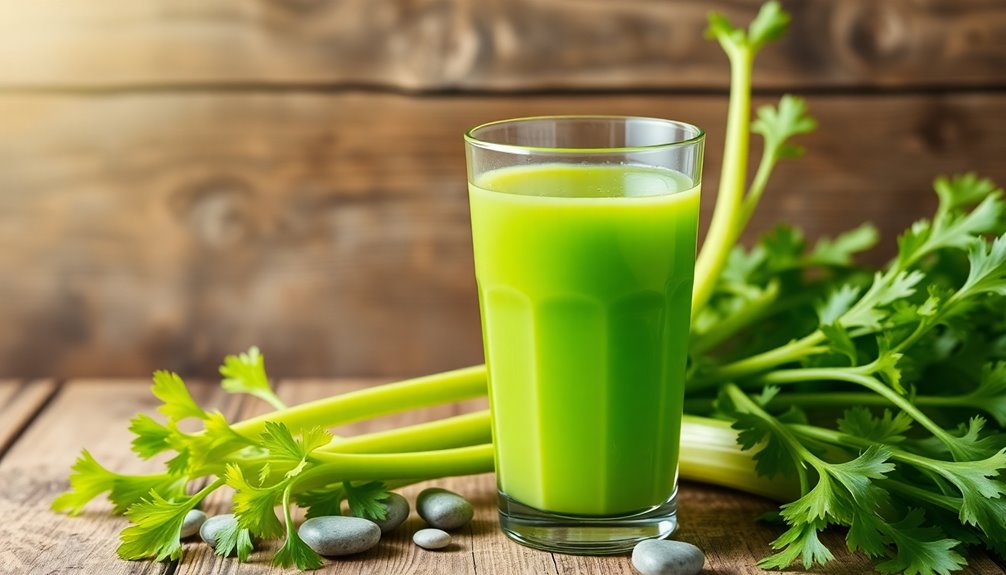
When it comes to supporting kidney function, celery juice offers impressive health benefits that you shouldn't overlook. This natural remedy has been shown to considerably reduce crystal deposition in renal tubules, which helps improve overall kidney function.
If you're dealing with chronic kidney disease, celery juice can effectively lower proteinuria levels, enhancing kidney filtration efficiency. Plus, it maintains higher hemoglobin levels to prevent anemia, boosting your quality of life.
The antioxidant properties of celery juice also play an essential role by reducing oxidative stress markers, further promoting kidney health. Additionally, studies show that it reduces inflammation and cell death in the kidneys, making it a valuable addition to your diet for ideal kidney function.
Protective Effects Against Kidney Damage
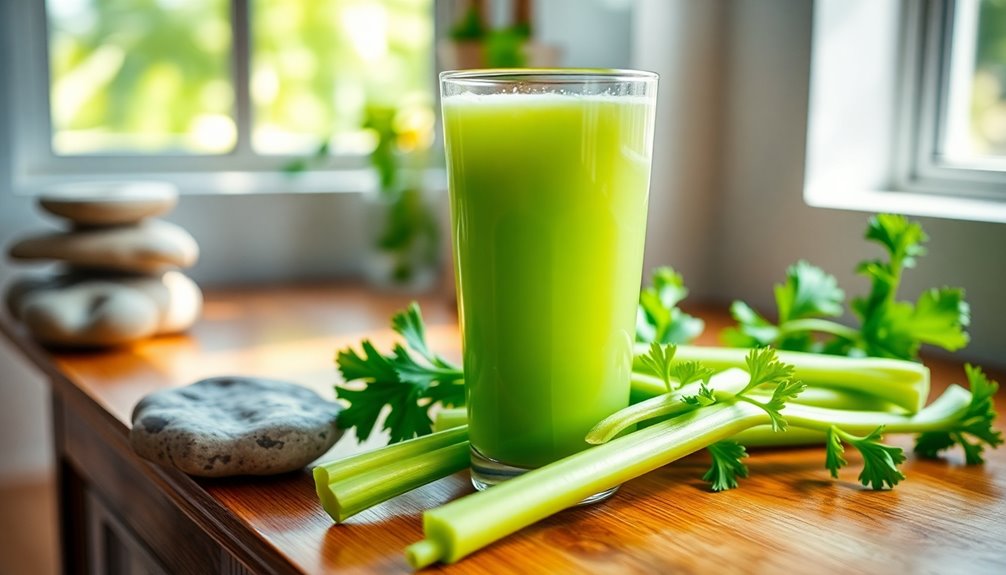
Celery juice not only supports kidney function but also offers protective effects against kidney damage. Its antioxidant properties help combat oxidative stress, which often contributes to kidney damage.
By reducing crystal deposition in renal tubules, celery juice mitigates potential harm from urolithiasis. In studies involving chronic kidney disease, it's shown to maintain hemoglobin levels, effectively preventing anemia.
Additionally, celery juice can lower proteinuria levels, indicating improved kidney filtration efficiency. Healthier glomeruli and renal tubules have been observed in treated models, emphasizing its protective effects.
If you're looking to enhance your kidney health, incorporating celery juice into your diet could be a beneficial step in safeguarding against kidney damage and promoting overall kidney function.
Reduction of Proteinuria Levels
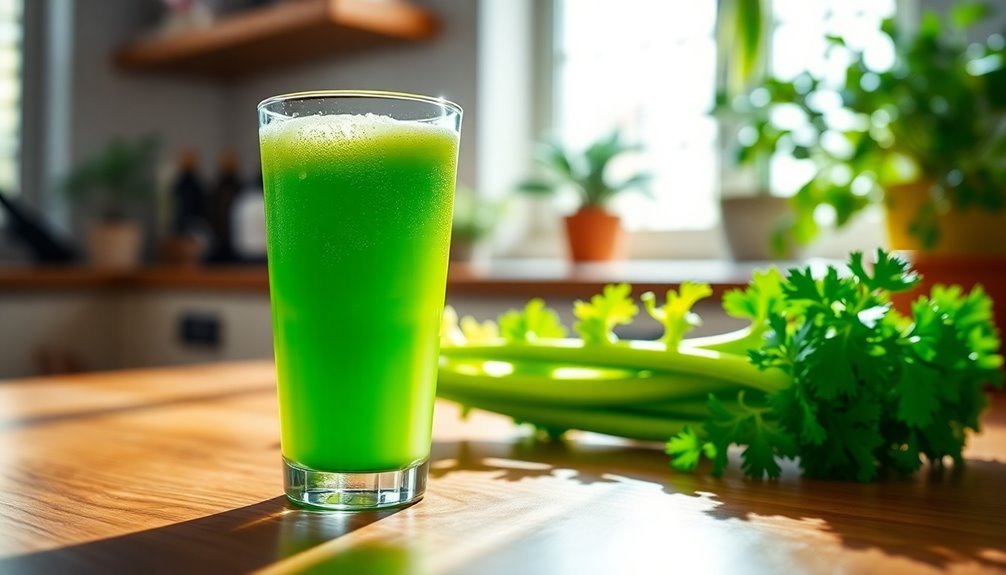
If you're looking to support your kidney health, paying attention to proteinuria levels is essential.
Studies show that celery juice can greatly reduce these levels, indicating improved kidney function.
Proteinuria and Kidney Health
Research indicates that incorporating celery juice into your diet may help reduce proteinuria levels, which is vital for maintaining kidney health.
Studies show that celery juice markedly lowers proteinuria, suggesting improved renal efficiency. This reduction is particularly beneficial for those at risk of chronic kidney disease.
The antioxidant properties of celery juice play an important role in this process by combating oxidative stress in kidney tissues.
Additionally, celery extracts have displayed therapeutic effects in various models, including notable decreases in proteinuria when administered at specific dosages.
Celery Extract Dosage Effects
When considering the effects of celery extract on proteinuria levels, it's clear that dosage plays an essential role in achieving ideal kidney health.
Research indicates that a dosage of 250 mg/kg of celery extract greatly reduces proteinuria, suggesting improved kidney function. This reduction is imperative, as proteinuria serves as a key marker for renal health.
Additionally, celery extract helps combat oxidative stress, enhancing overall kidney function. Regular consumption can lead to healthier kidney tubules and glomeruli, promoting the protective effects your kidneys need.
These findings support the therapeutic use of celery extract, particularly in managing chronic kidney disease. By incorporating the right dosage into your routine, you can take meaningful steps toward better renal health.
Prevention of Anemia in Chronic Kidney Disease

If you're managing chronic kidney disease, you might be interested in how celery juice can help prevent anemia.
Research suggests that a daily dosage of 250 mg/kg of celery extract can boost hemoglobin levels, enhancing your overall kidney health.
Celery's Role in Hemoglobin
Celery juice plays an essential role in maintaining hemoglobin levels, which can help prevent anemia in individuals with chronic kidney disease (CKD).
Research shows that celery juice can effectively increase red blood cells and hematocrit, vital for blood health. Its antioxidant properties combat oxidative stress, a significant factor contributing to anemia in CKD patients.
By incorporating celery juice into your diet, you can support kidney function and improve overall health. This natural remedy has therapeutic use, enhancing your quality of life by maintaining adequate hemoglobin levels.
With regular consumption, you're not just nourishing your body; you're actively working to prevent anemia and promote better kidney health. Embrace the benefits of celery juice and take charge of your well-being!
Dosage for Anemia Prevention
For individuals managing chronic kidney disease (CKD), understanding the correct dosage of celery extract can be significant in preventing anemia.
Research indicates that an effective dosage is 250 mg/kg body weight per day. By maintaining higher levels of hemoglobin, red blood cells, and hematocrit, celery extract plays an important role in improving your overall health and quality of life.
This beneficial therapy not only supports hemoglobin levels but may also help protect kidney function, reducing the risk of anemia in those with compromised kidney health.
Consistently adhering to this dosage can be an essential part of your strategy for preventing anemia, enhancing your well-being, and managing CKD effectively.
Celery Juice and Its Anti-Inflammatory Properties
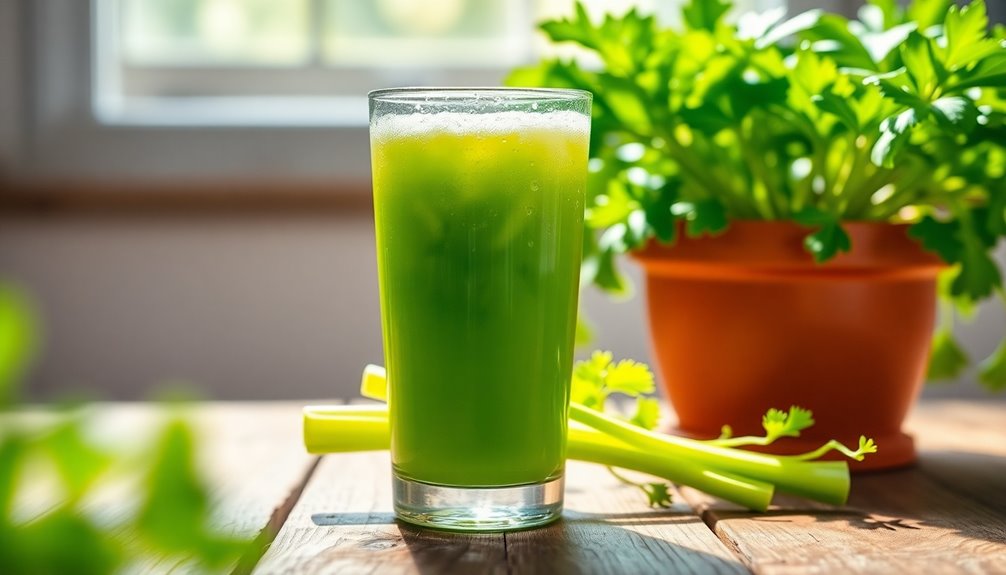
While many people seek natural remedies to support their health, the anti-inflammatory properties of celery juice stand out as a compelling option.
This juice contains luteolin, a compound known to reduce gut inflammation and promote overall anti-inflammatory effects in your body. By lowering oxidative stress markers, celery juice can enhance kidney health and function, especially in chronic kidney disease models.
Research shows it considerably reduces inflammation and cell death in kidney tissues, helping combat conditions like proteinuria, which indicates kidney function impairment.
With its rich antioxidants, celery juice not only supports kidney health but also mitigates chronic inflammation linked to various diseases. Incorporating it into your diet could be a simple yet effective way to maintain your well-being. Additionally, chia seeds are known to offer high levels of antioxidants, which can further support overall health.
Nutritional Composition of Celery Juice
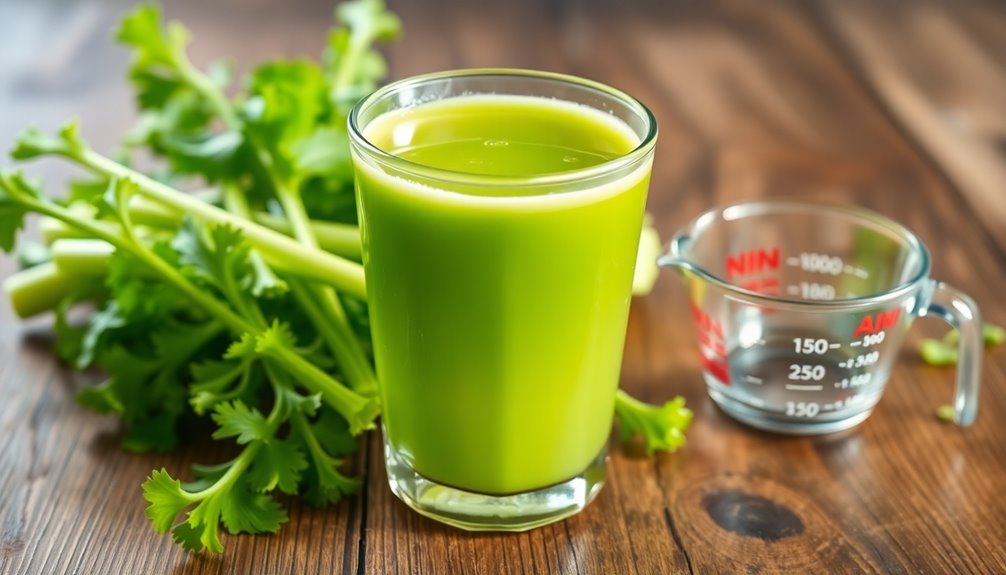
The nutritional composition of celery juice makes it a standout choice for health-conscious individuals. With only 50 calories per 10-ounce serving, it packs a punch with essential vitamins and minerals.
You'll get 90 mcg of vitamin K, 110 mcg of folate, and 781 mg of potassium, which supports kidney health and hydration. Celery juice is also low in sugar, containing just 3 grams per cup, making it a smart option for those monitoring their intake.
Additionally, it's rich in antioxidants and anti-inflammatory properties thanks to flavonoids like apigenin and luteolin. This combination of nutrients not only enhances your overall nutritional value but also promotes better kidney function, making celery juice a worthy addition to your diet. Furthermore, its antioxidant properties can help mitigate oxidative stress, further supporting kidney health.
Potential Downsides of Celery Juice
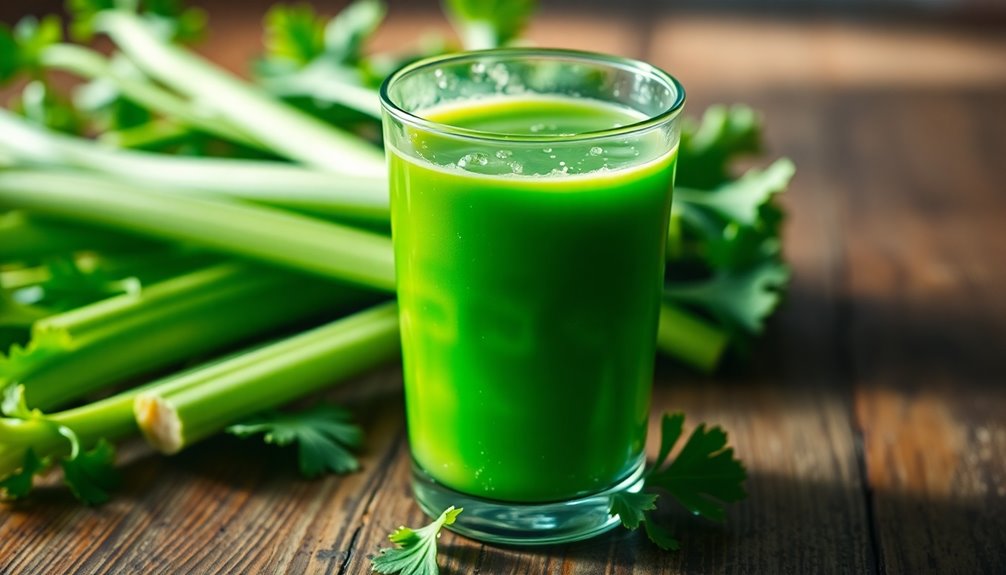
Celery juice offers impressive nutritional benefits, but it's important to be aware of its potential downsides.
For instance, with about 189 mg of sodium per cup, it mightn't be suitable for individuals with kidney issues or those on salt-restricted diets. The low fiber content can lead to increased hunger and possible nutritional deficiencies if it replaces whole foods in your diet.
Additionally, celery juice contains oxalates, which in high amounts can contribute to kidney stones, posing risks for those with existing kidney conditions. Some commercially available options might also include added sugars, undermining their health benefits and straining your kidneys.
Plus, the long-term effects of consuming celery juice remain largely unclear, so moderation is key. It's also worth noting that a raw food diet can provide valuable nutrients that support overall health and kidney function when balanced properly.
Recommendations for Safe Consumption
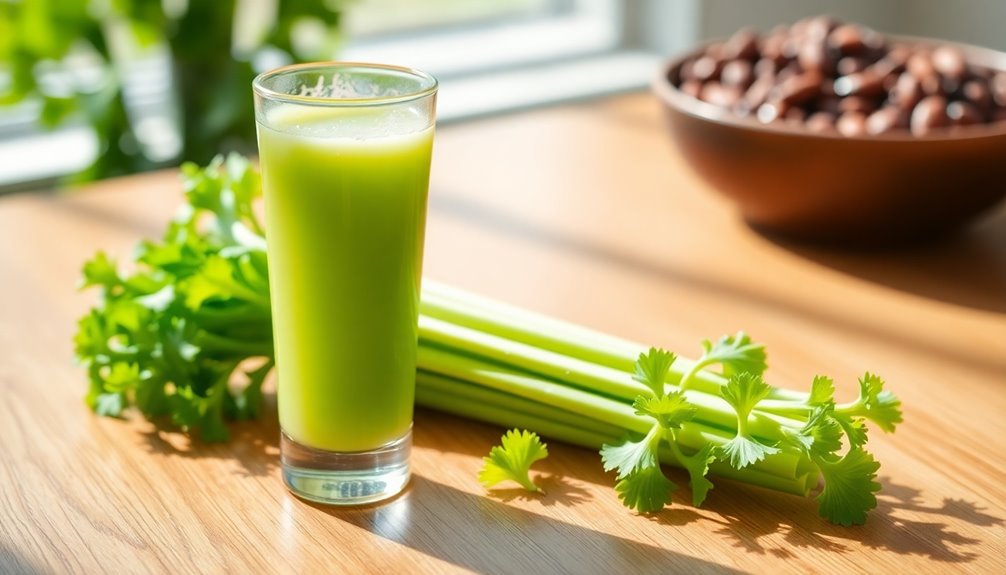
To safely enjoy the benefits of celery juice, it's crucial to consume it in moderation as part of a balanced diet. Aim for about 250 mg/kg of body weight per day to harness its protective effects on your kidneys.
Keep in mind the sodium content—about 189 mg per cup—can be an issue for those on sodium-restricted diets, so monitor your intake if you have kidney issues. Consulting a healthcare provider before starting a celery juice cleanse is wise, especially if you have pre-existing kidney conditions.
Drinking it unstrained helps retain beneficial fiber, supporting digestive health, while straining may lead to nutrient loss. Regular consumption may even help reduce proteinuria levels, promoting better kidney filtration efficiency.
Frequently Asked Questions
Does Celery Juice Improve Kidney Function?
Celery juice can improve kidney function by reducing inflammation and oxidative stress, which are harmful to your kidneys.
Studies show it helps lower protein levels in urine, indicating better filtration efficiency.
It also supports the maintenance of healthy red blood cells and hemoglobin, which is essential for individuals with chronic kidney issues.
Can Celery Unclog Arteries?
You might wonder if celery can unclog arteries. While celery contains beneficial compounds that support heart health and improve blood flow, it can't directly unclog arteries on its own.
Eating a diet rich in fruits and vegetables, including celery, can help lower cholesterol and reduce inflammation, contributing to better cardiovascular health.
However, it's crucial to maintain a balanced lifestyle and consult a healthcare professional for any serious heart concerns.
Who Should Not Take Celery Juice?
If you've got a history of kidney stones, you should definitely steer clear of celery juice.
It's high in oxalates, which can worsen your condition. Additionally, if you're on a sodium-restricted diet due to hypertension, be cautious; celery juice packs about 189 mg of sodium per cup.
Also, if allergies to celery run in your family, it's best to avoid it to prevent any adverse reactions.
Always consult a healthcare provider for tailored advice.
What Organs Does Celery Juice Help?
Celery juice can benefit several organs in your body.
It's particularly good for your kidneys, as it helps reduce oxidative stress and inflammation.
You'll also find that it supports liver health by aiding in detoxification processes.
Additionally, celery juice can promote heart health by lowering blood pressure and cholesterol levels. Moreover, the antioxidants found in celery juice can help to reduce inflammation, which is another contributing factor to heart disease. By incorporating celery juice into your daily routine, you may not only experience improved cardiovascular function but also enjoy a natural way to manage your health. These celery juice benefits for blood pressure make it a simple yet effective addition to a heart-healthy diet.
Conclusion
In the grand symphony of health, celery juice plays a revitalizing note for your kidneys. Its protective benefits and anti-inflammatory properties can help your body dance through challenges like proteinuria and anemia. However, like any melody, moderation is key; too much can lead to unwanted consequences. So, sip mindfully and let this green elixir support your kidney health, harmonizing with your overall well-being—it's a natural miracle worth considering!
Cindy thoroughly researches juicing trends, techniques, and recipes to provide readers with practical advice and inspiration. Her writing style is accessible, engaging, and designed to make complex concepts easy to understand. Cindy’s dedication to promoting the advantages of juicing shines through her work, empowering readers to make positive changes in their lives through the simple act of juicing.

